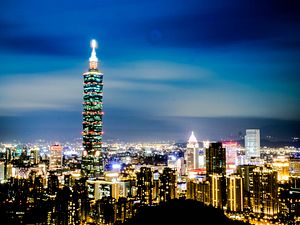Taiwan President Tsai Ing-wen has expressed her disappointment in the Chinese government’s decision to suspend a program allowing individual tourists from 47 cities to visit Taiwan.
The program, launched in 2011 to residents of Beijing, Shanghai, and Xiamen, and later expanded, was suspended starting Thursday. Business travelers and organized tour groups will still be allowed to visit Taiwan.
Since Tsai’s election in 2016, the number of Chinese tour groups entering Taiwan has steadily declined. Along with rising tourist numbers from Southeast Asian countries, however, the nation has seen an influx of individual Chinese tourists – an achievement consistently touted by the president, whose assertive confrontation of Chinese influence has gained plaudits ahead of a difficult bid for re-election in January 2020.
At a Thursday press briefing, Tsai criticized Beijing for making tourism into a political issue. “Tourism shouldn’t be politicized,” she said. “Political tourism is not sustainable tourism, either.”
“China’s government is making a mistake by prohibiting individual travelers from coming to Taiwan,” Tsai wrote on Twitter on Thursday. “They are depriving Chinese people of their right to experience our free and democratic lifestyle for themselves.”
Joseph Wu, Taiwan’s foreign minister, called the decision “very sad” on the ministry’s Twitter account. “They should be allowed to join more and more travelers from around the world in experiencing a country where freedom, openness and tolerance are the order of the day,” he wrote. “What’s to fear?”
Hours after the sudden suspension came into effect, a man from China’s Guangxi province reportedly used a plastic dinghy to paddle from the coastal Chinese city of Quanzhou to Taiwan’s Kinmen Island, which lies just 6 kilometers away from China. The man, who said he was seeking freedom, was sent back to China by Taiwanese authorities.
Immediate Impact, Uncertain Future
In its terse Wednesday statement, China’s Ministry of Culture and Tourism did not elaborate on its rationale for suspending the program – which was piloted during the administration of former President Ma Ying-jeou, a time during which cross-strait ties were far more friendly.
On Thursday, China’s Taiwan Affairs Office spokesperson Ma Xiaoguang said the program was suspended due to changes in the cross-strait status quo, accusing Tsai’s ruling Democratic Progressive Party (DPP) of pushing for Taiwanese independence.
The travel ban came during a week in which China conducted military exercises in the Taiwan Strait, a common tactic used by Beijing to antagonize Taiwan and its international supporters. On Wednesday evening, a Chinese warship collided with a Taiwanese freight vessel in the Taiwan Strait, according to Taiwan’s Coast Guard Administration.
It also came amid the Tsai administration’s strident support of Hong Kongers protesting the city’s now-dormant extradition bill, police action against protesters, and Beijing’s influence in Hong Kong governance. Solidarity rallies in support of Hong Kong protesters have been held in Taipei, and its ruling government recently said it will consider granting protesters asylum. Hong Kong bookseller Lam Wing-kee remains in Taiwan after flying there in April over his fear of being extradited from Hong Kong to China.
In the past, Taiwan has allowed asylum seekers from the Chinese mainland to stay temporarily before transiting to a third country. The process, however, has frequently become messy as Taiwan lacks formal legislation governing refugee or asylum procedures.
Chinese asylum seekers Yan Kefen and Liu Xinglian were allowed to enter Taiwan in February on what Taiwanese authorities called “professional exchanges” after spending 125 days in Taiwan’s Taoyuan International Airport. Both men have since departed for Canada, where they have been granted asylum. In 2018, Chinese dissident Huang Yan was allowed entry into Taiwan, where she stayed for eight months until the United States approved her asylum request.
Taiwan currently requires Chinese individual travelers to possess a travel permit issued by the Chinese government before applying for entry into Taiwan. Some have suggested waiving this requirement to allow Chinese tourists to enter Taiwan from a third country, similar to how United States citizens have independently visited Cuba without the knowledge of the U.S. government. As of now, however, Beijing’s decision is a barrier to both dissidents and tourists wishing to visit Taiwan.
The decision will have an immediate impact on Taiwan’s tourism industry, including Kinmen Island, which heavily relies on tourism from China and has long pushed for further integration between itself and neighboring Fujian province.
Benny Wu, the chairman of the Taipei Association of Travel Agents, told Bloomberg the suspension came as “a shock to all of us” that would have “a huge impact on Taiwan’s tourism and economy.”
The South China Morning Post reported that Taiwan could see a loss of US$900.5 million in lost revenue and up to 700,000 fewer arrivals over the next six months due to the travel ban.
According to Taiwan’s Central News Agency, Taiwanese authorities responded to the suspension by announcing they would spend an additional US$115.8 million on promoting tourism in the fourth quarter of 2019.

































